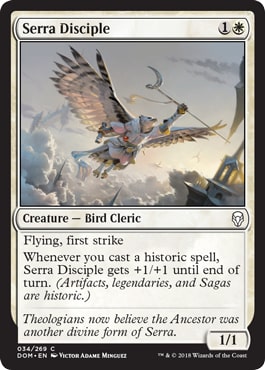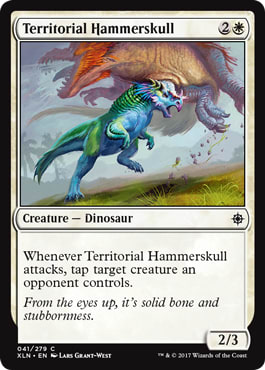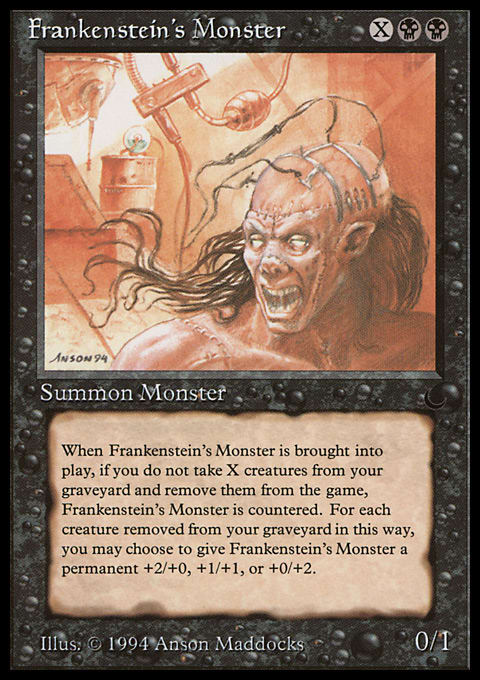I haven't played Magic for years, but I have read articles. I've been like that flabby jock, sitting on the couch watching plays on ESPN 8 ("The Ocho") and reliving his glory days -- and if reading articles on "Here's the pack, what's the pick?" could gift me with skill, I would be a gladiator.
But my first drafts when I returned to Magic were disastrous. I was no gladiator, but a smiling toddler with damp diapers staggering in to fight endless waves of Persians, 300-style.
So I've read a hundred "What's the pick?" articles. Why didn't they help me win?
Well, let's get some baseline assumptions out of the way:
Assertion #1: The Best Way To Learn How To Draft Better Is To Watch Better People Draft.
So what did improve my Magic game?
A couple of days spent watching Pros draft.
Now, let's be honest: it's not the astute commentary of the Pros that make watching their drafts valuable. In fact, you could replace a lot of notable streamers with a Fisher Price See-n-Say ("The cow goes MOO"), because honestly most of them have a scant handful of thoughts that they repeat over and over:
*pulls string*
"That's a good card, but it's off-color."
*pulls string*
"That's a good card, but I already have two and won't play three."
*pulls string*
"This pack is unsatisfying."
*pulls string*
"That's a Serra Disciple, which only scrubs have in their deck, and you probably have two of them in your deck, don't you, Ferrett Steinmetz, you big honkin' loser?"
Okay. Maybe I'm still a little personally called out by Pascal Maynard -- but the point is, watching good players walk through their thought processes, redundant though those thoughts may often be, shows you how a deck is shaped. And we'll --
Hang on. I need to give you the next assertion, but because it's relevant before we proceed any further:
Assertion #2: Text Articles Are For People Who Don't Have Time For Video.
Have you ever been about half an hour into a disappointing movie on Netflix, and wondering if this film was going to be worth wasting the rest of your evening on?
I bet you do the same thing that I do: "Hey, let's Wikipedia the plot to see if this film gets better -- "
"Time to drop the Netflix and just chill."
And lo! This is how a good summarized text can save you time. Videos can be good, but you gotta have the spare time to watch a video (albeit usually in the background), and most of those videos are an hour minimum, and only that short when the streamer in question bombs out in the first round.
(If I streamed Magic Arena, all my videos would be twenty minutes long, because I'd do so badly I'd somehow lose the round in the middle of Pack #2. "But I -- " "No. Sorry. That was the Batman Vs Superman of picks, Ferrett. You aren't allowed to play anymore.")
Articles, however, can be read in fifteen minutes tops. If you don't have time to watch the game, you can snarf down a summary. They're fantastically useful that way. But you lose something in the process of converting real life into paragraphs -- you have to leave something out. As such, a large portion of what makes a writer a good writer is "knowing what portions need to be put in."
But do Magic sites reward good writers, or just pro writers? Hey, you're way ahead of me; we'll get to that in assumption #4. But let's get into the big assumption here:
Assertion #3: Drafts Are Much More Complex Than "What's The Pick?"
So here's a weird data point: this last weekend was not, disappointingly, Dominaria drafting on Magic Arena. It was Rivals of Ixalan Block.
I played anyway, because I'd had a bad weekend (not one, but both of my parents had to go into the hospital for heart problems, on opposite coasts) and I needed to chill the heck out. And you know what happened?
My draft records went way up. Like, I was usually managing about 2-4 wins per seven-block in Dominaria draft; in Rivals, I usually averaged 3-5, with a couple of full runs of 7 -- which I never managed in Dominaria, and that wasn't because I'd gotten a lot better at drafing; my skills were about the same as what they'd always been.
I started to analyze that, as is my wont. And I figured out when I won:
It was with the clearly marked archetypes.
Vampires were easy: plop down a bunch of tiny dudes and swarm, with enough of a top end to push through for the final few points. Merfolk, too, were easy -- also lots of little dudes, but you had to be more aggressive because no lifegain and more evasion. And Ascend decks were pretty good for me, because that path was clearly mapped.
When did I bomb out? To quote NOFX, "Dinosaurs Must Die." Unlike Merfolk or Vampires, the question of "What did a good Dinosaurs deck look like?" was really hard to answer -- it was clearly not just ramping into big crashy dudes, or making midrange.
The recipe for a Vampires deck was simple. It was clear when I was lacking the proper ingredients. But Dinosaurs needed its own kind of removal and ramp to clear a pathway for its own subtler win conditions -- and unlike Vampires, it wasn't clear what cards propelled me down the "proper" path.
Likewise, Pirates. I saw some good Pirates decks, but I wasn't sure how to piece them together. Merfolk were hexproof and swarm, but figuring out what the prototypical Pirates deck looked like wasn't clear from the cards alone.
I could pick all the good cards I liked; I have no doubt that every card in my deck was the most potent in the pack, in the vacuum I was picking it in.
But what I was actually trying to do -- or should have -- was to get as close as possible to an archetypical Pirates deck, knowing what cards I didn't have yet. I mean, I had lots of removal in my Dinosaurs decks, but they were the wrong kinds of removal for the problems I actually faced. (And honestly, I'm still not sure what sorts of removal I'd need, or even necessarily when to fire it off.)
And yet the picks I often see focus on first or second-pick, because hey, that's the exciting part! You get to shape your deck! And that's great, when you realize you get an In Bolas's Clutches and realize you gotta go Blue because this is a Bomb Rare.
But the rest of the picks become "How do you maximize the strength of that In Bolas's Clutches"? -- and that's something that sexy, sexy first pick leaves out. Sure, the first-pick decks usually aren't that slam-dunk, and the smarter pack choices give you some interesting balances between, say, a strong flier and a mediocre removal spell --
Yet again. That's often in a vacuum. If you first-pick that mediocre removal, what deck makes that shine? What collection of other cards should you be prioritizing to make that removal function, and when is it worth moving away from that? Like, you'll need twenty-one other cards minimum to make this work.
I mocked pro streamers earlier for being a See-n-Say, but what they're actually repeating a lot of the time is the same comment:
*pulls string*
"That card is good in isolation, but it doesn't fit into my deck's strategy."
*pulls string*
"I want that card, but how can I fit it into my deck's strategy?"
*pulls string*
"It's getting late in the draft, and my deck is lacking critical cards to make its strategy work."
*pulls string*
"FERRETT, YOU STILL SUUUUUUCK"
Quiet, Pascal.
Now, it's not that "What's the pick?" doesn't ever come up. It does. It's one of the core skills.
But the question that "What's the pick?" is trying to answer, is, "What collection of cards am I trying to get to assemble it into a gestalt?"
Because the difference between a mediocre deck and a solid deck is knowing what kinds of cards you're lacking to make this deck hum. I won with Vampires because I knew, instinctively, that too many little weenie guys would lead to too many games where my Mini-Me army wouldn't be fast enough -- so I always picked up a couple of big finishers to close out the game, and usually a couple of grindy cards to recycle old threats.
If the question of "What's the pick?" had been as simple as "Oh, get the good Vampires," I wouldn't have seen Territorial Hammerskull as a way of punching through damage, something to prioritize around pack #2.
You get to see that in a full draft video. "Why did he take a dinosaur in a Vampires deck?" And it's made clear.
So why do we see so many picks in isolation?
Assertion #4: What's The Pick Articles Are Easy To Write.
So what's easier:
Knowing an archetype well enough to break it down into its component must-haves to make its full strategy blossom, then analyzing it and communicating that in ways that describe some platonic ideal of a deck, or:
"Hey, this came up in Pack 1, Pick 3, what do you think?"
Come on. You know the answer.
Which is not to say that there's no writers who don't try to provide context, showing an interesting choice somewhere in the hinterlands of Pack #2 or #3, but that's significantly harder because you have to not only remember what your deck looked like at this point in the draft, but you also have to assume your audience is paying significant enough attention to your deck to understand the pick.
Which reminds me of a piece of advice I got at the Clarion Writers' Workshop, when we were dissecting each other's short stories -- someone had written a story that depended on the reader remembering the opening quote at the beginning of the tale, and nobody got the reference. And the writer was horrified, because it was a beautiful quote, and I think it was James Patrick Kelly (a writer well worth reading) who said:
This is absolutely true.
(More worryingly, a private poll I took on Twitter later on confirmed that about 1 in 10 people skip the opening prologue to a book, figuring the real meat is in Chapter One, which was worrisome A F at the time because my book Flex had a prologue that you kiiiiiinda needed to read. Ah well.)
Anyway, my point is that for most people, I'd bet they read the good articles that discuss the interesting picks something like this:
- 1 Never
- 2 Gonna Give
- 1 You Up Never
- 3 Gonna Let You
- 1 Down Never Gonna
- 1 Run Around
- 1 Or Desert
- 1 You
. . . okay, actually, I'm genuinely surprised "Run Around" isn't a Magic card. A Red one.
But still, it's hard to say that people are dissuaded from writing "What's the Pick?" articles, because:
Assertion #5: There's Nothing A Reader Likes More Than Getting Made To Feel Important.
Hey.
What did you think of this article?
Leave a comment and weigh in!
It's an intoxicating drug, thinking that someone wants to hear from you, and "What's the Pick?" articles are like a needle sliding into that sweet, collapsed junkie-vein. The comments sections will come alive as people debate and weigh in with what they believe should have been the pick, and to debate with those who do not hold the One True Faith of the Good Card, and so forth.
And furthermore, as noted, the picks are usually context-free and so can appeal to everybody. You don't have to feel dumb because you don't know whether this is a good pick for ![]()
![]() Dinosaurs -- it's early on, the field's still wide open, what's got the most power.
Dinosaurs -- it's early on, the field's still wide open, what's got the most power.
I could argue, but will skid to the precipice and stop, to say that "What's the Pick?" articles actually mislead novitiates into thinking in terms of raw potency and not synergy.
So from the writer's perspective, you could write an excellent article on missing pieces in archetypes, but when a "What's the pick?" garners an equally compelling response from the fandom, it's hard to justify putting fingers to keys for the more difficult article.
So What's The Pick?
So you've got an article type that, in general, usually generates more feedback than strategy. And they're reasonably popular, and make good Twitter-polls.
What else do we have to combat a potentially toxic article type?
Well, the good news is that I've already answered that: watching good players do full drafts will fill you in on what a good deck looks like, if only by watching them bemoan their fate as they fail to pull it together. As a former editor who still tracks article types as if he's looking to start his own site tomorrow, I can tell you that while "What's the Pick?" articles are still about, they're not nearly as pernicious as they were five years ago.
YouTube and Twitch have done a lot to foment easy access to better players. You can watch the best pros in the world going head to head in tournaments, and sometimes hear them justify their decisions in real-time.
*hitches up Abe Simpson belt* When I started out playing Magic in 1996, we didn't even have access to lists of cards! It's true. You'd open up a card that nobody at your gaming shop had seen before, making every pack a Willy Wonka Golden Ticket paradise. I literally traded a rare Frankenstein's Monster for a common AF Giant Spider because we didn't even have rarity symbols to tell us "DANGER WILL ROBINSON, YOU ARE ABOUT TO MAKE AN UNWISE DECISION." The idea that there would be people who would get paid to play Magic, and that you could watch them do so, would have been craaaaaazypants talk to Past Ferrett, who would have been honestly surprised to hear that Magic would still be played in 1998.
Also, I wore an onion on my belt, as was the fashion at the time.
That said, what about the residual What's The Pick articles?
Well, you combat that by realizing those articles, while not bad, can be a kind of steroid for a very specific skill -- and like steroids, which tend to drain other parts of the body in order to fuel those bristling packets of swole-ness, you can absolutely ace the skill of picking a single good card in Pack 1 and then watching the rest of the draft surpass you.
To quote the master, "Go, then. There are other worlds than these." Focus on archetypes, on good plays, on all the other skills that you'll need to rip through the draft properly. Watch videos, but if you don't have time for videos, read the right articles.
And if you write articles, well, avoid that draw of the cheap column to try to get something more in-depth than the early picks. Focus on gaps, on overall strategies, on key plays a deck needs to make.
But whatever you do, don't make the rookie mistake I did: Spending 2,000 words bitching about an article type that, as I admitted in the last segment, is already dying off. That would be a colossal waste of time.
Signing off,
Ferrett Steinmetz, a.k.a. "Ferrett, The"
BUY MY BOOKS































